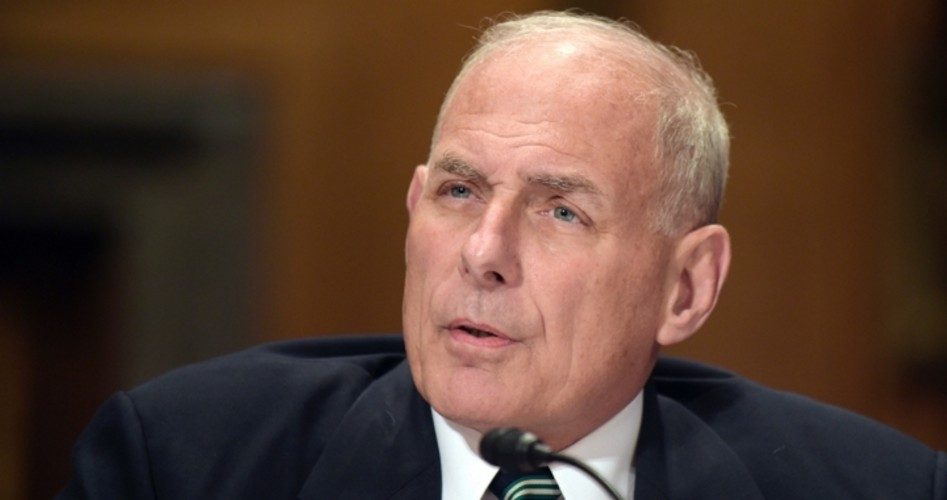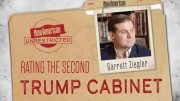
It was all sweetness and light on Friday when President Donald Trump announced that he had replaced his Chief of Staff Reince Priebus, with his head of the Department of Homeland Security John Kelly (shown). Tweeted the president: “I am pleased to inform you that I have just named General/Secretary John F. Kelly as White House Chief of Staff. He is a Great American and a Great Leader. John has also done a spectacular job at Homeland Security. He has been a true star of my Administration.”
Ten minutes later the president tweeted his thanks to Reince Priebus for his work over the first six months of his presidency: “I would like to thank Reince Priebus for his service and dedication to his country. We accomplished a lot together and I am proud of him!”
Priebus dutifully responded in kind in a statement issued 30 minutes later:
It has been one of the greatest honors of my life to serve this president and our country. I want to thank the president for giving me this very special opportunity.
I will continue to serve as a strong supporter of the president’s agenda and policies. I can’t think of a better person than General John Kelly to succeed me and I wish him God’s blessings and great success.
That was all for the benefit of the press and for public consumption. The position of Priebus had been in jeopardy almost from the beginning. Despite naming Priebus as his chief of staff at the start of his administration, Trump never forgot that it was Priebus, former head of the Republican National Committee (RNC), who suggested that he consider dropping out of the presidential race last October after the “Access Hollywood” tape of Trump’s crude remarks about women from years earlier surfaced.
Priebus never enjoyed the complete confidence of the president as evidenced by the president not giving him sufficient authority to create a strong organizational structure in the West Wing (the three floors of the White House that contain the offices of the chief of staff, the counselor to the president, the senior advisor to the president, the White House press secretary, and their support staffs). As Peter Baker of the Boston Globe noted presciently:
Priebus represented a more conventional breed of senior White House figure, chosen by the president despite a career defined by the calculations of traditional Republican Party politics, which Trump regards as part of “the swamp” he was elected to drain.
Conversations about terminating Priebus had been going on behind the scenes for nearly two weeks but the precipitating moment was the hiring of Anthony “The Mooch” Scaramucci as White House communications director. He reported directly to the president as did Priebus, and the clash of personalities led to loud disagreements. The end of Priebus was signaled by his reluctance to respond to Scaramucci’s attacks on Priebus in a left-wing magazine charging him with being part of those leaking stories to the press and suggesting that the FBI investigate him over the matter. When Priebus declined to respond, Trump took that as not only weakness but also a tacit admission that somehow Priebus was at least indirectly responsible for some of those leaks, perhaps by just looking the other way.
It also helped that Kelly had close personal ties to Trump, that the president was pleased with the job he had been doing at the DHS, and that he was a four-star Marine general not used to backing down in the face of adversity. As Baker suggested, “The president became convinced that Priebus was not strong enough to run the White House operation and that he needed a general to take charge.”
Peter Nicholas of the Wall Street Journal came to the same conclusion: that Trump’s parting of the ways with Sean Spicer and Reince Priebus reflects an attitudinal change in the White House:
A pattern that emerges in White House staff shuffles over the last six months is that Mr. Trump is parting ways with people who represent the Republican mainstream.
The political cleansing of Republican elites doesn’t mean that the fireworks are now over. What it means is that a Marine general will be facing off with a vulgar, self-serving Wall Streeter over the Trump administration’s public face. It is also likely to mean that the White House will be taking a much tougher stance against the anti-Trump media in various briefings. There’s a war going on and Trump is bringing in heavier artillery to meet the enemy.
Photo of John Kelly: AP Images
An Ivy League graduate and former investment advisor, Bob is a regular contributor to The New American magazine and blogs frequently at LightFromTheRight.com, primarily on economics and politics. He can be reached at [email protected].
Anthony Scaramucci — the “Mooch” — Named as Trump’s Communications Director



